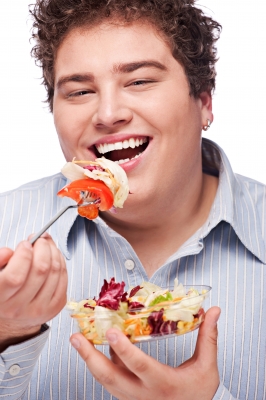Aussie comedian and singing actress Rebel Wilson starred in the comedy musicals, ‘Pitch Perfect” and ‘Pitch perfect 2’playing the role of the likeable ‘Fat Amy’ who’s outspoken and hilarious personality made her an instant hit and role model to countless plus size women around the globe.
There’s a stigma around the plus sized and overweight. Some believe that they all have a choice, they’re lazy, impulsive and unlikeable. In contrast, the multi-talented actress/comedienne and hardworking Rebel Wilson has been an ambassador for Jenny Craig Weight loss Centres in Australia, has studied law and can also carry a tune!
Obesity and Excessive Weight Gain
While some of us are genetically predisposed to being large size individuals, obesity has been described as a modern day epidemic. We predominately see this phenomenon in western society where foods that are high in fats and refined sugars are readily available as a tasty, quick and easy alternative to healthy home cooking.
Leading nutritionists believe that today’s food environment might be a major cause for this change in public health that’s taken place within the last few generations.
How different levels of weight gain are categorised
Overweight – When a person has 10 – 20 percent) more weight above normal. (BMI – Body Mass Index.)
Obesity – when a person has 20 percent or more above ‘normal’ weight, or has a BMI of 30 or more.
Morbid Obesity – when a person has a BMI of 50 to 100 percent or more over ‘normal’ weight, or they’re overweight to the point where their health or normal functioning is affected.
Obesity Is A Preventable Health Threat Affecting Many Australians
According to the Huffington Post Australia, a study between 2014 -2015 has found an alarming 63.4% of Australians were found to be obese. Statistics also show that a staggering 25% of Australian children are also obese or overweight. Obesity rates continue to grow in Australia despite the government’s attempts to deal with the situation. The message seldom addresses the impact that obesity has on a person’s mental health.
In early 2015 the Australian Government introduced a ‘Health Star Rating System’ for food and drink products with a slogan, “The more starts, the healthier” in an attempt to help the public make healthier consumer choices.
The Impact Of Overeating & Lack Of Physical Exercise
Overeating has been known as a chronic risk factor to health increasing the likelihood of a person developing a physical illness or an eating disorder. The person who eats too much too often can put on excess weight rather fast. Excess body fat and lack of physical exercise are major contributors to cardiovascular disease, type 2 diabetes, musculoskeletal conditions, and some cancers. Being overweight can also hinder a person’s recovery from chronic illnesses.
Psychological Risks
Anxiety
Depression
Brain Fog
Low Self Esteem
Embarrassment to go out in public/Isolation
Guilt or Distress
Negative body image
Self harm or suicide attempts
Becoming overly sensitive about other people’s comments
Self hatred, disgust
Hormonal Imbalance
Physical Risks
Loss of energy/ Fatigue/Lethargy
Fearing disapproval of others
Diverticulitis
Bowel Diseases
Heart Disease
Adrenal Fatigue
Poor blood circulation
Type 2 Diabetes
Colon cancer and other types of cancer
Fatty Liver
Choosing To Be Healthy – Make A Decision – Talk To Someone
Although we are spoilt for choice, the start of successful weight management takes a decision to either change to a healthier diet or to seek professional help and then following that through with the right actions.
Eating healthy, drinking plenty of water and doing regular exercise might be easier said than done for people with an addiction/disorder. Professional help is required to help establish good attitudes and healthy eating behaviour.
A person with an eating disorder may be nervous, anxious, stressed, embarrassed, ashamed or even too scared to seek help. Others may still be in denial about their problem. Talking to your GP is a good starting point to discuss your concerns and to discover fruitful treatment strategies and available options.
Talking to your GP is a good starting point to discuss your concerns and to discover fruitful treatment strategies and available options.
Seek professional help as early as possible to prevent further damage to your mental and physical health. Counselling and a good dietician may be recommended.
Cognitive behavioural therapy can help an overeater learn new ways to think differently about food. It makes sense that if we are going to be detoxing our bodies that we also detox our negative thinking in order to change to a more positive attitude about our food consumption.
Exercise might be easier said than done for people with an addiction/disorder. Professional help is required to help establish good attitudes and healthy eating behaviour.
Cognitive Behavioural Therapy (Or CBT) can help an overeater learn new ways to think differently about food. It makes sense that if we are going to be detoxing our bodies that we also detox our negative thinking in order to change to a more positive attitude about our food consumption.
“75%-98% of physical, emotional and behavioural problems/illnesses are due to toxic thinking and negative choices.”Dr. Caroline Leaf, neuroscientist.
Dr Caroline Leaf said, “The brain controls the body but the MIND controls the brain. And for the mind to function optimally it needs to be controlled by your choices, which in turn need to be led by the Holy Spirit.”
Professional help is needed especially if you find it difficult to make that choice for a healthy change.
Where to get help
If you’d like to find out more, or talk to someone, here are some organisations that can help:
Butterfly National Support Line and Web Counselling Service (For Eating Disorders)
www.thebutterflyfoundation.org.au/web-counselling
Phone: 1800 ED HOPE / 1800 33 4673
Lifeline – Do you find yourself find in a Crisis? Call 13 11 14 or chat online
Beyondblue Do you have feelings of depression or anxiety? Call 1300 22 4636 or chat online.
Sources:
Statistics provided by Australian Institute of Health and Welfare: http://www.aihw.gov.au/overweight-and-obesity/
Binge Eating Disorder: http://www.eatingdisorders.org.au/eating-disorders/binge-eating-disorder
Emotional Eating Fuelling Australia’s Obesity Epidemic: http://www.abc.net.au/news/2016-02-18/emotional-eating-fuelling-australias-obesity-epidemic/7175204
Huffington Post Australia: http://www.huffingtonpost.com.au/2016/02/24/australia-obesity-statistics_n_9154422.html
ABC: http://www.abc.net.au/health/talkinghealth/factbuster/stories/2014/10/02/4098166.htm
Read more about the Governments Health Star Rating here: http://healthstarrating.gov.au/internet/healthstarrating/publishing.nsf/content/home
Image courtesy of: By Eva Rinaldi – Rebel Wilson, CC BY-SA 2.0, https://commons.wikimedia.org/w/index.php?curid=37233165
Bio – Rebel Wilson http://www.biography.com/people/rebel-wilson-21187753
The Obesity Stigma – Psychology Today https://www.psychologytoday.com/blog/food-junkie/201306/the-obesity-stigma
Read and approved by:
David Watkins
Tutor AIFC Sydney Team
Business Consultant, Coach & Counsellor
Bachelor of Business, Grad Cert Counselling
Grad Diploma Theology (process)









Have you thought about becoming a qualified counsellor? It’s a great opportunity to learn how you can extend God's love and grace to the hurting out in the community.
For those who would like to enrol in aifc’s accredited Christian counselling courses we have two intakes per year for courses commencing around the following months:
Enrolment Season - opens approximately 2 months prior to our courses commencing. Enrol online here during our enrolment season.
We also offer two modes of study:
A Master of Counselling course was introduced in 2018.